Excavation Contractors Wyke
Find top Excavating Contractors in Wyke
Get 3 FREE Excavation Contractor quotes for your project today! Compare profiles, reviews, accreditations, portfolio, etc... and choose the best offer.
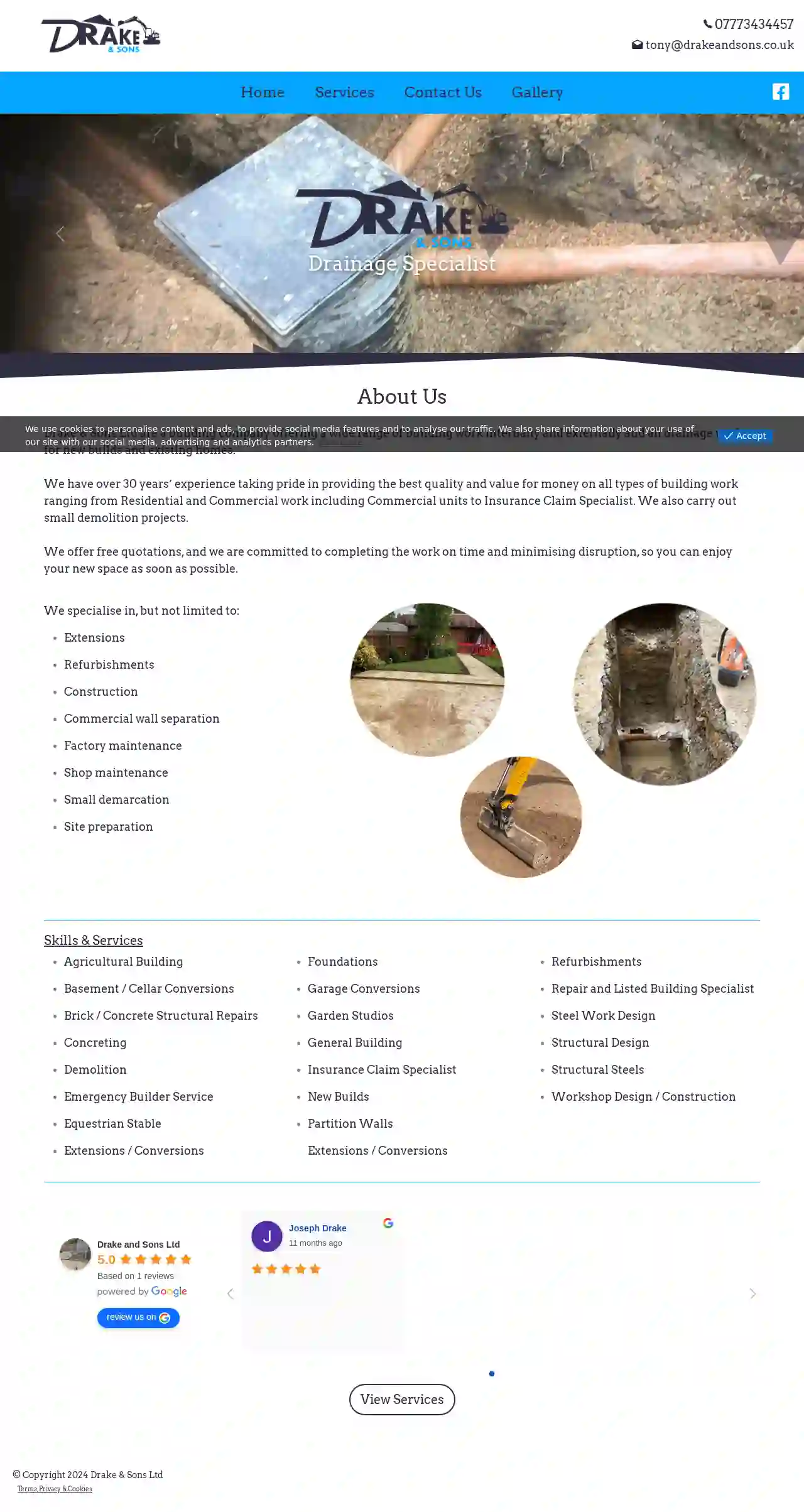
Drake and Sons Ltd
51 reviewsKeighley, GBAbout Us Drake & Sons Ltd are a building company offering a wide range of building work internally and externally and all drainage work for new builds and existing homes. We have over 30 years’ experience taking pride in providing the best quality and value for money on all types of building work ranging from Residential and Commercial work including Commercial units to Insurance Claim Specialist. We also carry out small demolition projects. We offer free quotations, and we are committed to completing the work on time and minimising disruption, so you can enjoy your new space as soon as possible. We specialise in, but not limited to: Extensions Refurbishments Construction Commercial wall separation Factory maintenance Shop maintenance Small demarcation Site preparation
- Services
- Why Us?
- Testimonials
- Gallery
Get Quote
ELC Asbestos Survey Keighley Ltd
52 reviews58 Victoria Rd, Keighley, BD21 1JB, GBWELCOME TO ASBESTOS SPECIALIST OF THE UK A Company You Can Rely On At Affordable Rates! We are a Licenced Health & Safety Nationwide with offices in Keighley, St. Helensshire, London, Scotland, Wales and the Midlands.Your one-stop destination for safe asbestos removal and disposal in UK. We provide a comprehensive range of asbestos removal services in UK for domestic, industrial and commercial properties.If you need a Survey or advice relating to your asbestos-related problems, we can provide you with packages that are customised to cater to your specific requirements. We apply the most effective and current techniques for removing asbestos quickly and safely.Detailed method statements are designed to make sure that best practices are implemented at all times and they are compliant with UKs rules and regulations.
- Services
- Why Us?
- Testimonials
- Gallery
Get Quote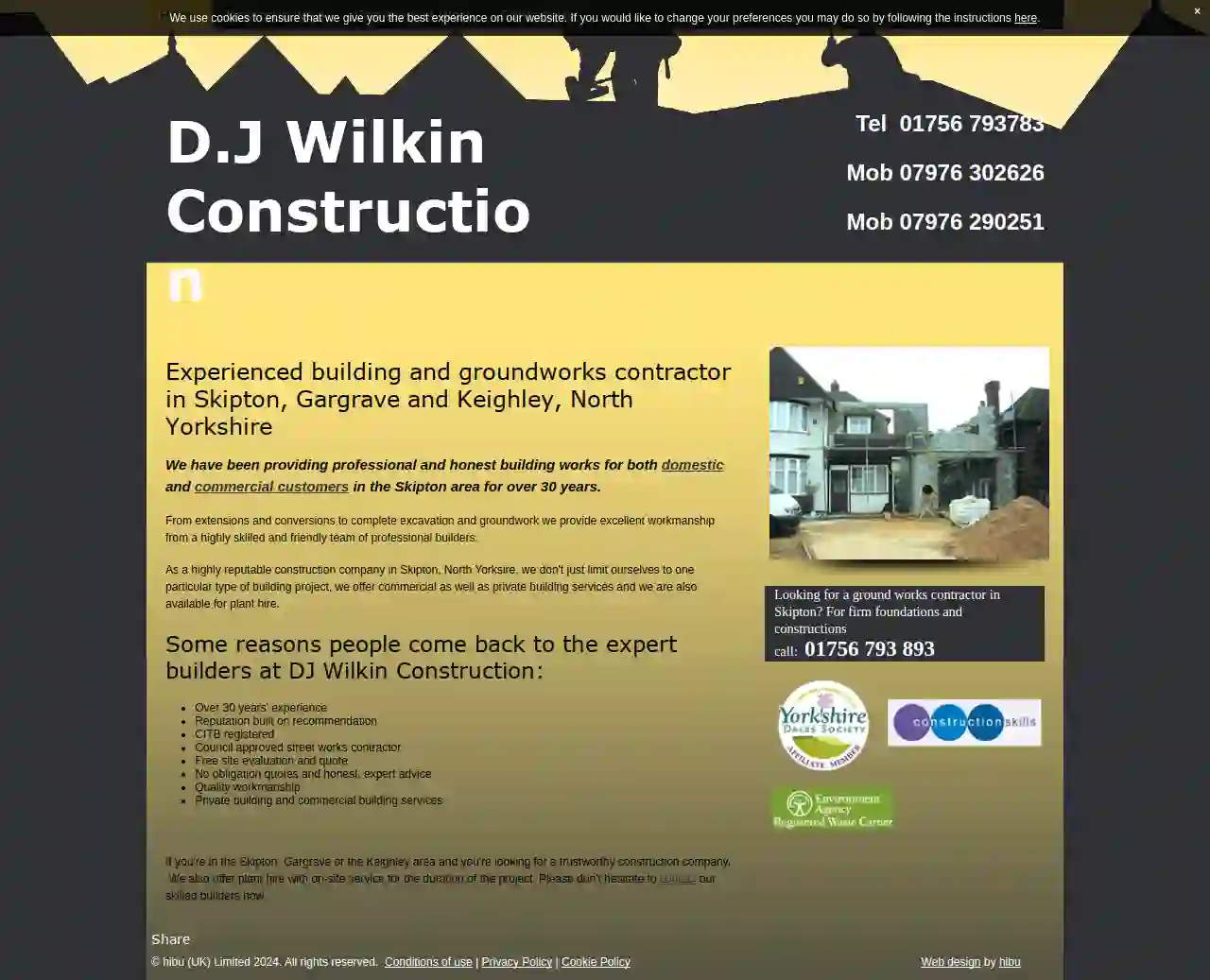
D J Wilkin Construction Ltd
DJ Wilkin Construction, SKIPTON, Skipton, BD23 2JW, GBDJ Wilkin Construction: Your Trusted Building and Groundwork Experts in Skipton DJ Wilkin Construction is a CITB registered and council approved contractor with over 30 years of experience serving the Skipton, Gargrave, and Keighley areas. We're dedicated to providing high-quality building and groundwork services for both domestic and commercial clients. Our team of skilled and friendly builders is committed to delivering exceptional workmanship on every project. From groundworks, excavations, and reinforcements to house extensions, conversions, and complete building projects, we handle it all. We also offer plant hire and on-site service for the duration of your project. What sets us apart? Over 30 years of experience Reputation built on recommendations CITB registered Council approved street works contractor Free site evaluation and quote No obligation quotes and honest, expert advice Quality workmanship Private and commercial building services Whether you're looking to extend your home, renovate your property, or undertake a large-scale commercial project, DJ Wilkin Construction is your trusted partner. Contact us today for a free consultation and a no-obligation quote.
- Services
- Why Us?
- Gallery
Get Quote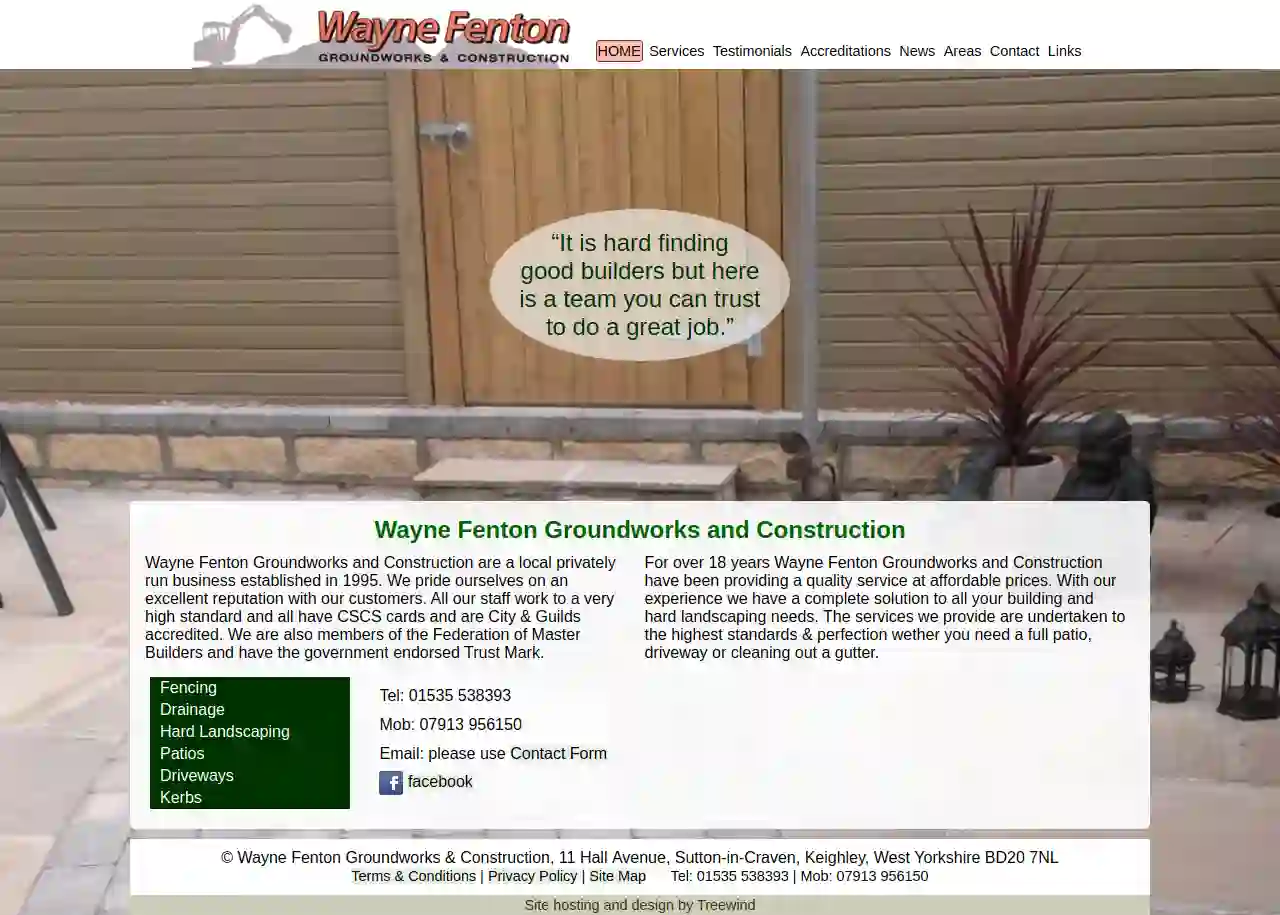
FENTON GROUNDWORKS
51 reviews11 Hall Avenue, Sutton-in-Craven, Keighley, West Yorkshire, BD20 7NL, GBWayne Fenton Groundworks and Construction Wayne Fenton Groundworks and Construction is a local, privately run business established in 1995. We take pride in our excellent reputation with our customers. All our staff work to a very high standard, hold CSCS cards, and are City & Guilds accredited. We are also members of the Federation of Master Builders and have the government-endorsed Trust Mark. For over 18 years, Wayne Fenton Groundworks and Construction has been providing a quality service at affordable prices. With our experience, we offer a complete solution to all your building and hard landscaping needs. Whether you need a full patio, driveway, or gutter cleaning, our services are undertaken to the highest standards and perfection.
- Services
- Why Us?
- Accreditations
- Testimonials
- Gallery
Get Quote
Wharfedale Drain Services
51 reviewsBarn End Cottage, Sykes Lane, Oakworth, Keighley, West Yorkshire, BD22 7JT, GBYour Best Local Drain Cleaning Service Wharfedale Drain Services have been working in the drain services industry for over 10 years. We carry out all types of work from small patch lining repair jobs to excavations and laying new drains. All our work is fully insured and guaranteed for your peace of mind. We use our top of the range CCTV survey equipment to help accurately diagnose issues. Why Choose Us There are many reasons to choose us. Here are three: 10 Years' Experience Fully Insured CSCS health & safety Here’s What Our Clients Say about Us "These guys are brilliant! We had a helluva problem in Keighley with water suddenly flooding our garden that was not straight forward and Damian and Ollie were fantastic. They were very professional, explained everything clearly and worked tirelessly to get the job done. I would highly recommend them to anyone." - Sarah, Keighley
- Services
- Why Us?
- Testimonials
- Gallery
Get Quote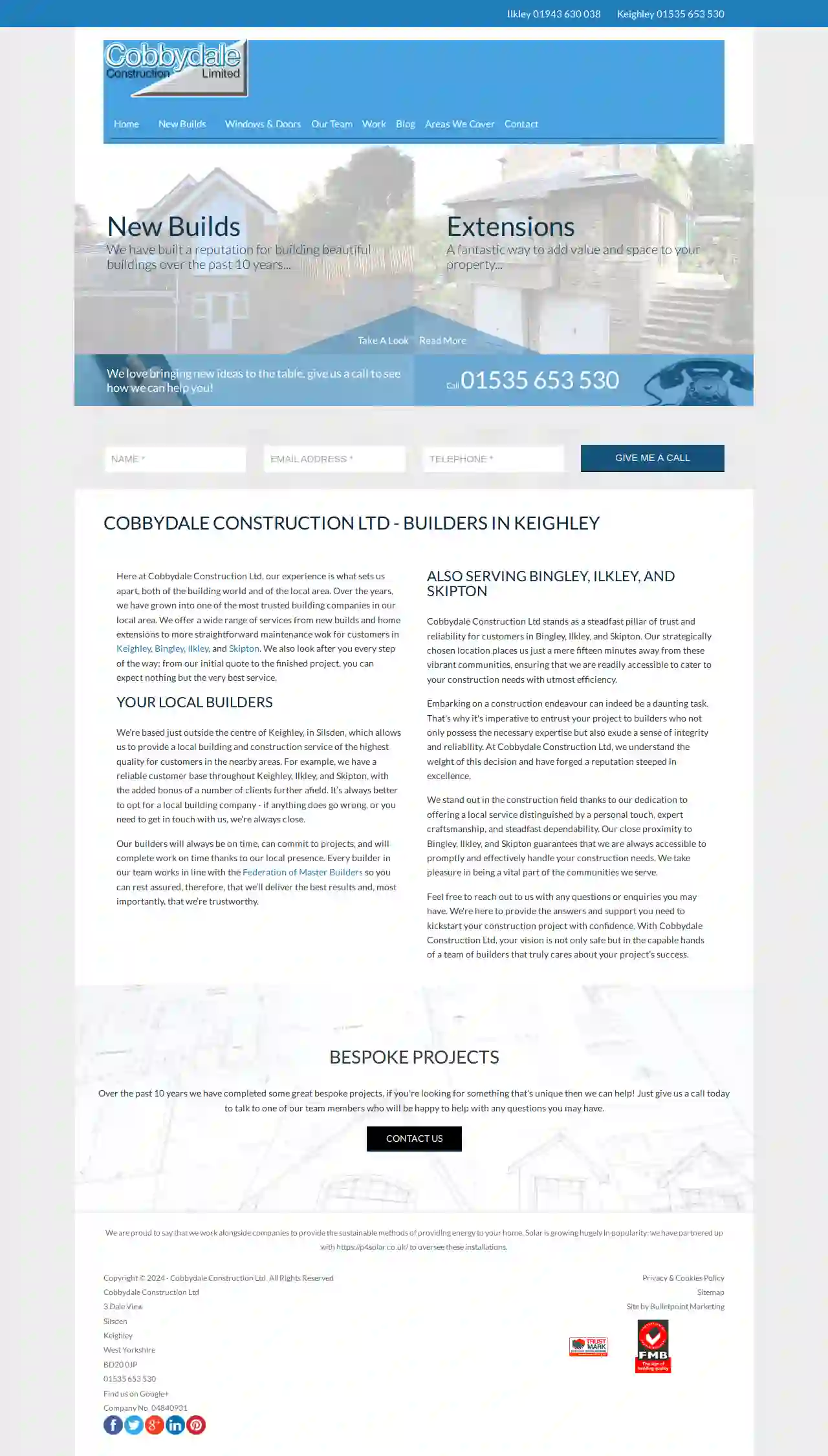
Cobbydale Construction Ltd
3.610 reviews3 Dale View, Silsden, 3 Dale ViewSilsden, Keighley, BD20 0JP, GBCobbydale Construction Ltd - Builders In Keighley Here at Cobbydale Construction Ltd, our experience is what sets us apart, both of the building world and of the local area. Over the years, we have grown into one of the most trusted building companies in our local area. We offer a wide range of services from new builds and home extensions to more straightforward maintenance work for customers in Keighley, Bingley, Ilkley, and Skipton. We also look after you every step of the way; from our initial quote to the finished project, you can expect nothing but the very best service. Your Local Builders We’re based just outside the centre of Keighley, in Silsden, which allows us to provide a local building and construction service of the highest quality for customers in the nearby areas. For example, we have a reliable customer base throughout Keighley, Ilkley, and Skipton, with the added bonus of a number of clients further afield. It’s always better to opt for a local building company - if anything does go wrong, or you need to get in touch with us, we’re always close. Our builders will always be on time, can commit to projects, and will complete work on time thanks to our local presence. Every builder in our team works in line with the Federation of Master Builders so you can rest assured, therefore, that we’ll deliver the best results and, most importantly, that we’re trustworthy. Also serving Bingley, Ilkley, and Skipton Cobbydale Construction Ltd stands as a steadfast pillar of trust and reliability for customers in Bingley, Ilkley, and Skipton. Our strategically chosen location places us just a mere fifteen minutes away from these vibrant communities, ensuring that we are readily accessible to cater to your construction needs with utmost efficiency. Embarking on a construction endeavour can indeed be a daunting task. That's why it's imperative to entrust your project to builders who not only possess the necessary expertise but also exude a sense of integrity and reliability. At Cobbydale Construction Ltd, we understand the weight of this decision and have forged a reputation steeped in excellence. We stand out in the construction field thanks to our dedication to offering a local service distinguished by a personal touch, expert craftsmanship, and a commitment to delivering exceptional results. Our team of skilled tradesmen are dedicated to providing the highest quality workmanship, ensuring that your project is completed to the highest standards.
- Services
- Why Us?
- Testimonials
- Gallery
Get Quote
Central Paving & Groundwork Ltd
4.212 reviewsKeighley, GBCentral Groundwork Ltd: Your Trusted Partner for Groundwork Services Central Groundwork Ltd is a leading provider of high-quality groundwork services in the UK. We are committed to delivering exceptional results for our clients, no matter the size or complexity of the project. Our team of experienced professionals is dedicated to providing a comprehensive range of services, including: Excavation Drainage Foundations Driveways Patios And more! We pride ourselves on our attention to detail, our commitment to safety, and our ability to work efficiently and effectively. We are also fully insured and accredited, giving you peace of mind that your project is in safe hands. Whether you are a homeowner, builder, or developer, Central Groundwork Ltd is the perfect partner for your next groundwork project. Contact us today for a free consultation and let us help you bring your vision to life.
- Services
- Why Us?
- Gallery
Get Quote
MJL Groundworks & Civils Ltd
45-46 Pegholme, Wharfebank Business Centre, Ilkley Road, Otley, LS21 3JP, GBAbout MJL Groundworks & Civils Ltd MJL Groundworks & Civils Ltd is a leading provider of groundworks and civil engineering services across Yorkshire. We offer a comprehensive range of services to meet the needs of our clients in the residential, commercial, utilities, and general civil engineering sectors. Founded in 2020 as MJ Build Solutions Ltd by Managing Director Matthew Oxley, our company was established with the goal of providing unique and tailored construction management services. Matthew, a Chartered Construction Manager through the CIOB (Chartered Institute of Building) and a Chartered Manager through the CMI (Chartered Management Institute), brings over 25 years of experience in the industry, primarily in the water utilities sector, where he has worked on extensive Civil Engineering projects. In 2023, we rebranded to MJL Groundworks & Civils Ltd to better reflect our expanded service offerings and the wealth of experience within our team. We are committed to delivering projects safely, within budget, and on time, while maintaining the highest standards of quality workmanship. Our team is equipped with the knowledge and expertise to successfully complete projects that meet your expectations. We cover the whole of Yorkshire and have multiple gangs with diverse skillsets to handle your specific needs. H&S Management is a top priority, and our Site Management team is available to discuss any project requirements you may have.
- Services
- Why Us?
- Our Team
- Gallery
Get Quote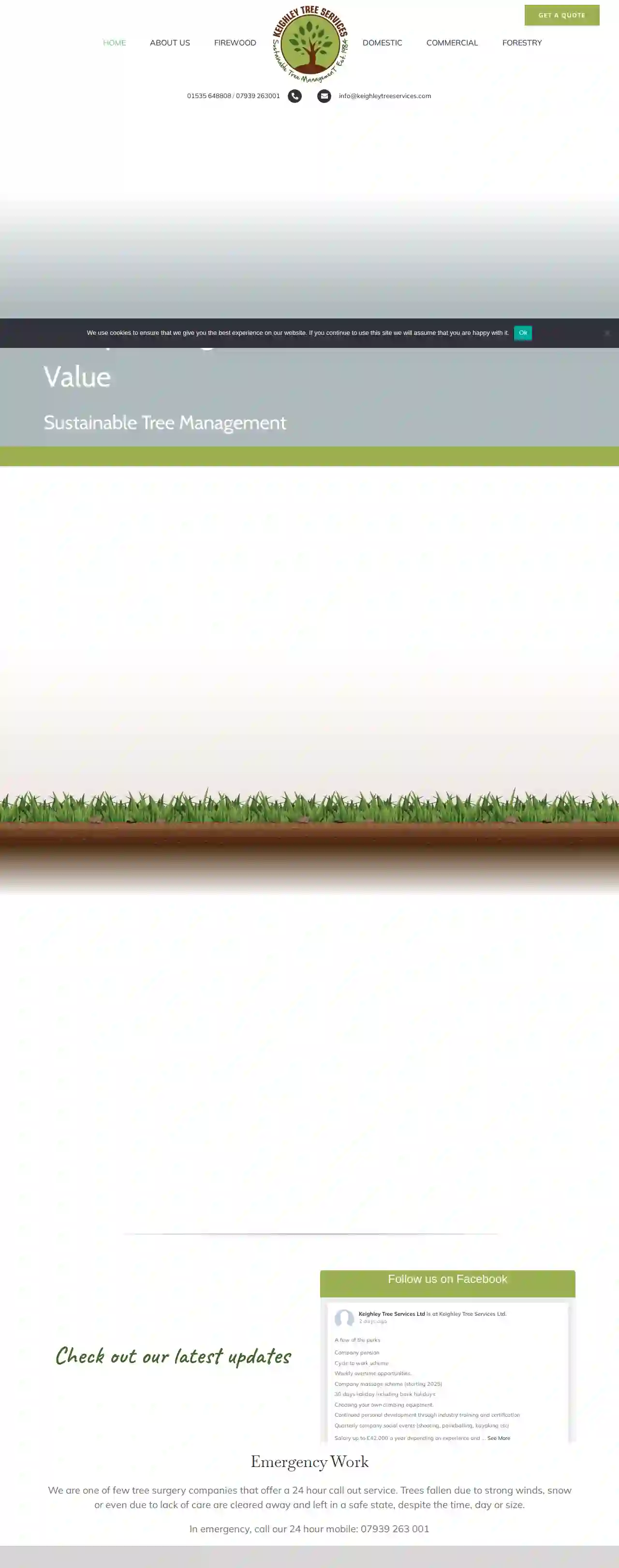
Keighley Tree Services Ltd
4.693 reviewsKeighley, GBAlways Giving Best Value We provide a variety of services, ranging from tree health to garden privacy and also attend trees to your personal preference. Please select one of the options below to see what services we can offer you.
- Services
- Why Us?
- Gallery
Get Quote
Davidson Site Services Ltd
51 reviewsAscot Buildings, Off Starkie StreetKeighleyWest Yorkshire, Ascot BuildingsOff Starkie StreetKeighleyWest Yorkshire, Keighley, BD21 1PH, GBAbout Davidson Site Services Ltd Davidson Site Services Ltd is a leading provider of commercial racking solutions. We offer a wide range of racking systems, including cantilever, pallet, vertical and pigeonhole racks. We also offer a bespoke service to suit your needs, as well as repairs and inspections. Our expert design team will ensure your racking installation is perfectly suited to your stock type, storage space and available equipment. If conventional pallet racking cannot meet your storage needs, we have many solutions and innovations which could be offered or developed to meet your businesses specific needs. Why Choose Us? Our installers are employed by Davidson Site Services and not subcontracted to third party companies. This ensures we can keep control of the quality of our installation at all times. Our installers have worked with us for many years and they understand the quality of workmanship required. Installation We understand that any closure can have a detrimental impact on your business so, in order to minimise the disruption to your staff and customers, our experienced site engineers will install your racking systems, or undertake your store fit-out, at a time to suit you.
- Services
- Why Us?
- Testimonials
- Gallery
Get Quote
Over 13,059+ Excavation Businesses in our network
Our excavation contractors operate in Wyke & beyond!
ExcavationHQ has curated and vetted Top Excavation Pros near Wyke. Find a trustworthy business today.
Frequently Asked Questions About Excavation Contractors
- Project Size and Scope: The larger and more complex the excavation, the higher the cost.
- Soil Type: Different soil types require different equipment and techniques, impacting costs. Rocky or clay-rich soil can be more expensive to excavate than loose soil.
- Accessibility: Difficult-to-access sites might require specialized equipment or additional labor, increasing expenses.
- Disposal Costs: Hauling away excavated material (soil, rocks, etc.) to disposal sites incurs additional fees.
- Permits and Inspections: Depending on local regulations, permits and inspections might be required, adding to the overall cost.
- Hauling to Designated Disposal Sites: Transporting excavated material to approved landfills or recycling centers.
- Recycling or Reuse: If suitable, some excavated soil might be recycled for other projects or reused on-site for landscaping or backfilling.
- Complying with Regulations: Adhering to local and environmental regulations for soil disposal to prevent contamination or illegal dumping.
- Basement Size: The larger the basement, the more excavation is required, increasing the cost.
- Soil Type: Excavating rocky or dense clay soil is generally more expensive than loose soil.
- Accessibility: Difficult-to-access sites might require specialized equipment or more labor, driving up costs.
- Foundation Type: The chosen foundation type (full basement, crawl space, slab) affects excavation needs.
- Underpinning: If underpinning (strengthening existing foundations) is necessary, it significantly increases costs.
- Disposal Fees: Hauling excavated soil to disposal sites adds to the overall expense.
How much does excavation cost?
How do you handle soil disposal after excavation?
How much does it cost to excavate a basement?
What is the difference between topsoil and subsoil?
Topsoil: The uppermost layer, typically rich in organic matter, nutrients, and microorganisms. It's essential for plant growth and is often darker in color.
Subsoil: The layer beneath the topsoil, containing less organic matter and generally denser. It provides support for roots but is less fertile than topsoil.
During excavation, topsoil is often removed and preserved separately for later use in landscaping, while subsoil is typically used for backfilling or other less demanding applications.
How much does excavation cost?
- Project Size and Scope: The larger and more complex the excavation, the higher the cost.
- Soil Type: Different soil types require different equipment and techniques, impacting costs. Rocky or clay-rich soil can be more expensive to excavate than loose soil.
- Accessibility: Difficult-to-access sites might require specialized equipment or additional labor, increasing expenses.
- Disposal Costs: Hauling away excavated material (soil, rocks, etc.) to disposal sites incurs additional fees.
- Permits and Inspections: Depending on local regulations, permits and inspections might be required, adding to the overall cost.
How do you handle soil disposal after excavation?
- Hauling to Designated Disposal Sites: Transporting excavated material to approved landfills or recycling centers.
- Recycling or Reuse: If suitable, some excavated soil might be recycled for other projects or reused on-site for landscaping or backfilling.
- Complying with Regulations: Adhering to local and environmental regulations for soil disposal to prevent contamination or illegal dumping.
How much does it cost to excavate a basement?
- Basement Size: The larger the basement, the more excavation is required, increasing the cost.
- Soil Type: Excavating rocky or dense clay soil is generally more expensive than loose soil.
- Accessibility: Difficult-to-access sites might require specialized equipment or more labor, driving up costs.
- Foundation Type: The chosen foundation type (full basement, crawl space, slab) affects excavation needs.
- Underpinning: If underpinning (strengthening existing foundations) is necessary, it significantly increases costs.
- Disposal Fees: Hauling excavated soil to disposal sites adds to the overall expense.
What is the difference between topsoil and subsoil?
Topsoil: The uppermost layer, typically rich in organic matter, nutrients, and microorganisms. It's essential for plant growth and is often darker in color.
Subsoil: The layer beneath the topsoil, containing less organic matter and generally denser. It provides support for roots but is less fertile than topsoil.
During excavation, topsoil is often removed and preserved separately for later use in landscaping, while subsoil is typically used for backfilling or other less demanding applications.